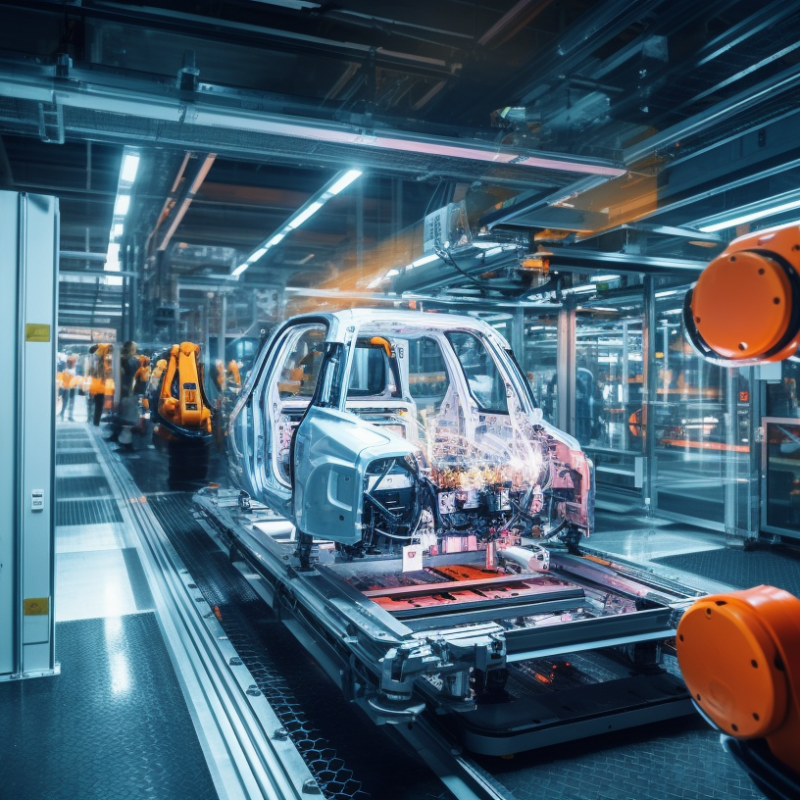Chief AI Officer (CAIO):
The new key position
Have you ever wondered who is responsible for the use of artificial intelligence (AI) in a company?
Get to know the Chief AI Officer or Chief Artificial Intelligence Officer (CAIO), an increasingly important position in today’s corporate world.
In this article, you will learn all about the tasks, qualifications and challenges of a Chief AI Officer and why this role is indispensable in the era of digitalization.
Key Takeaways:
- A Chief AI Officer develops and implements a company’s AI strategy.
- The main tasks are the strategic planning of AI initiatives, AI governance and coordination with other specialist departments.
- The role of the CAIO is becoming increasingly important with the growing integration of AI technologies.
Overview: What is a Chief AI Officer (CAIO)?
A Chief AI Officer (CAIO) is an executive who is specifically responsible for planning, implementing and monitoring AI technologies within an organization .
In times when AI is increasingly being integrated into business processes, the Chief AI Officer plays a decisive role in the design and implementation of the AI strategy. In some companies, the Chief Digital Officer (CDO) or Chief Innovation Officer (CIO) is currently often responsible for activities relating to artificial intelligence, but a specialized Chief AI Officer is increasingly being appointed.
But what exactly does a CAIO do?
What does a Chief AI Officer do?
A Chief AI Officer (CAIO) is responsible for developing and implementing a company’s AI strategy.
The main tasks include the strategic planning and implementation of AI technologies, monitoring AI governance and ensuring compliance with ethical standards.
The CAIO works closely with other executives to ensure that AI initiatives are aligned with business objectives.
The CAIO also mediates between technical teams and non-technical staff to ensure the smooth integration of AI solutions into existing business processes.
Are you looking for a Chief AI Officer?
Growing importance of the CAIO
The role of the CAIO is becoming increasingly important as companies use AI to gain a competitive edge, increase efficiency and develop innovative solutions.
A CAIO ensures that AI initiatives are not only technologically, but also strategically sensible and ethically justifiable.
This ensures that AI projects meet the company’s objectives and make a sustainable contribution to business success. The CAIO also examines how the AI initiatives are in line with the existing digitalization strategy.
Main responsibilities of a Chief AI Officer
Strategic planning and implementation of AI technologies
A CAIO develops a comprehensive AI strategy that encompasses all aspects of the company.
This includes identifying areas in which AI offers the greatest benefits, as well as selecting and implementing suitable technologies.
- Technology selection: Evaluate and select AI tools and platforms that meet the organization’s specific needs and goals.
- Pilot projects: Initiating and managing pilot projects to validate AI applications before they are rolled out company-wide.
- Scaling: Planning and implementing the scaling of successful AI projects in order to maximize their benefits.
Monitoring AI governance and compliance with ethical standards
Ensuring that AI systems are operated ethically and legally is another key task of the CAIO.
This includes compliance with data protection regulations and the avoidance of bias in the AI models.
- Data protection: implementation of measures to protect personal data and ensure compliance with data protection laws such as the GDPR
- Transparency: Ensuring the traceability and transparency of AI decisions in order to create trust among employees and customers.
- Ethics: Development and implementation of ethical guidelines for dealing with AI in order to avoid discrimination and injustice.
Collaboration with other managers for AI initiatives
A CAIO works closely with other executives to ensure that AI initiatives support business objectives and are coordinated across departmental boundaries.
- Strategic alignment: Ensuring that the AI strategy is in line with the company’s overarching business strategies and objectives.
- Interdisciplinary collaboration: Promoting collaboration between IT, data and business departments in order to utilize synergies and work together on AI projects.
- Change management: support for the introduction of AI-based processes and systems, including employee training and engagement.
Qualifications and skills of a Chief AI Officer
Necessary technical and business qualifications
A successful CAIO has in-depth knowledge in areas such as machine learning, data analysis and IT structures.
At the same time, business management skills are essential in order to evaluate and communicate the economic impact of AI projects.
- Technical knowledge: Expertise in algorithms, data models and AI frameworks.
- Data competence: Understanding of data architectures and data management in order to use data effectively for AI applications.
- Business acumen: Ability to evaluate and maximize the ROI (return on investment) of AI projects.
Leadership qualities and experience in change management
As the introduction of AI is often associated with significant changes in the company, a CAIO needs outstanding leadership skills and experience in change management.
This includes the ability to lead teams and navigate through complex transformation processes:
- Leadership: Ability to inspire and motivate teams to achieve common goals.
- Collaboration: Promoting a collaborative working environment that supports innovation and problem solving.
- Adaptability: Flexibility to adapt to changing circumstances and technologies.
Ability to mediate between technical and non-technical teams
A CAIO must be able to explain complex technical concepts in an understandable way and act as a bridge between technical and non-technical departments.
- Translation: Ability to present technical details in a way that is understandable to laypersons.
- Empathy: Understanding the perspectives and needs of different stakeholders.
- Intercultural communication: Ability to communicate effectively in multinational and interdisciplinary teams.
AI training is an important building block for Chief AI Officers. Empowering employees by providing training and workshops is an important element of AI implementation in order to spread knowledge about AI throughout the company and actively promote its use.
AI training for your company?
Challenges and solutions
Dealing with data privacy and security concerns
A major obstacle to the implementation of AI is ensuring data protection and data security.
The CAIO must develop strategies to protect sensitive data while taking advantage of data analytics.
This includes the implementation of security protocols and encryption techniques to protect data from unauthorized access.
It is equally important to comply with all relevant data protection laws and regulations in order to minimize legal risks.
Creating a cultural shift towards the adoption of AI-based decisions
The introduction of AI often requires a cultural change.
A CAIO must create a culture of trust and acceptance for AI by clearly communicating the benefits and advantages of AI applications.
To promote this change, the CAIO can organize information campaigns and training to increase the understanding and acceptance of AI. This can be a decisive factor in the introduction of AI, especially for medium-sized companies (Read more: AI in SMEs)
It is also important to involve employees in the AI implementation process in order to address their concerns and gain their support.
Integration of AI into existing IT systems and business processes
Integrating AI into existing IT infrastructures and business processes can be complex.
The CAIO must ensure that new AI systems are seamlessly integrated into the existing architecture to maximize efficiency and productivity.
This requires ensuring the compatibility of new AI solutions with existing systems and technologies.
In addition, existing business processes must be adapted and optimized in order to fully exploit the benefits of AI.
A robust support and maintenance system for AI applications is also crucial to ensure their long-term effectiveness and reliability.
Future prospects for the Chief AI Officer
How will the role of the Chief AI Officer develop over the next few years?
The role of the CAIO will continue to evolve in the coming years as AI technologies become more sophisticated and versatile.
CAIOs will play a key role in using these technologies to develop innovative solutions and enable new business models.
In industries such as healthcare, financial services and manufacturing, AI can bring huge improvements.
A CAIO can help to identify and exploit these opportunities in order to secure competitive advantages and increase efficiency.
There are numerous examples of successful CAIOs who have contributed significantly to the success of their companies. Thanks to innovative AI solutions, they have optimized processes, opened up new business areas and increased their competitiveness.
We support you as Chief AI Officer
Conclusion: Chief AI Officer will play a key role in companies
In summary, it can be said that the Chief AI Officer plays a central role in modern corporate management.
Given the increasing importance of AI, companies should consider the possibility of appointing a CAIO to develop and implement their AI strategy.
Are you ready to reach the next level of digitization?
Consider how a CAIO can help your company take full advantage of AI. Let’s discuss it!
You might also be interested in
AI strategy: Successfully into the future with artificial intelligence generated by Midjourney Artificial intelligence (AI) is fundamentally changing companies: from automation in production and predictive analyses in marketing to the development of personalized services – AI is revolutionizing industries worldwide and offers enormous potential for efficiency gains and new business




